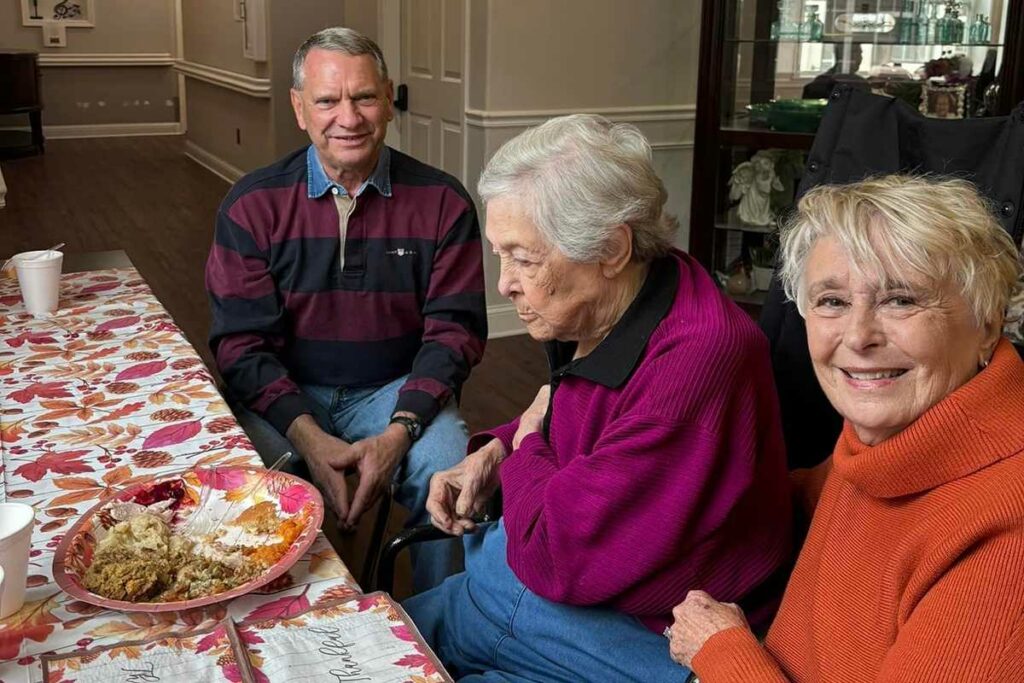Communicating with a loved one who has dementia can be challenging and often causes frustration and helplessness. Understanding how to connect with them effectively is vital for their well-being and your peace of mind.

At Known Memory Care, we believe in educating family members because it helps them connect with their loved ones. There are practical strategies to enhance communication, promoting a deeper bond and a more supportive environment. However, the first step is to develop a comprehensive understanding of dementia.
Dementia: Definition and Symptoms
Dementia is a broad term that encompasses a range of medical conditions, including Alzheimer’s, characterized by a decline in:
- Memory
- Language
- Problem-solving
- Comprehension
Even in the early stages, these changes can affect one’s ability to perform everyday activities and can significantly disrupt their lives. Understanding how to communicate with someone with dementia is essential for providing care and support.
As memory loss progresses, individuals often struggle with:
- Finding the right words
- Understanding complex sentences
- Following conversations
These symptoms of dementia can make verbal and written communication challenging, leading to feelings of frustration and isolation.
Dementia and Communication
The Known Memory Care team members know that effective communication reduces agitation and enhances the quality of life for people with dementia. It strengthens relationships, promotes a sense of identity and self-worth, and provides comfort.
So, what is the best way to talk to someone with dementia? Below are practical tips for handling this often complex terrain.
Understanding Dementia-related Communication Challenges
Verbal and Written Communication Disruptions
When someone has dementia, they may find it hard to talk or write like they used to. These changes happen slowly over time or come on quickly. Here are some common issues:
- Having trouble finding the right words
- Forgetting what simple words mean
- Constantly repeating the same word or phrase
- Writing difficulties
Common Dementia Communication Barriers
There are a few barriers that can make talking with someone who has dementia challenging. They might include:
- Trouble staying focused on one topic
- Getting upset easily
- Trouble understanding others
- Forgetting what was just said
- Being unable to read social cues, like body language or tone of voice
Impact on Family Relationships
It can be hard for everyone when a beloved family member no longer understands or remembers things. That can lead to:
- Feeling frustrated or upset
- Struggling to provide the right kind of support
- Feeling like the person with dementia is changing
- Becoming more stressed or anxious
Remember, it’s not the person’s fault when they’re having trouble communicating. The symptoms are related to changes happening in their brain.
Here are some of the best strategies to talk to a person with Alzheimer’s.
The Best Way to Talk to Someone with Dementia
Effective communication is not just about words. Our body language, tone of voice, and facial expressions speak volumes, too. Non-verbal cues are vital when communicating with someone who has dementia—a gentle touch or warm smile can convey more than words.
Just like anyone else, people with dementia have different personalities. Some might enjoy discussing their history as business owners, while others prefer to stay in the present and discuss the weather. Tailoring your communication to the person’s needs and preferences is always best, so find topics they enjoy and easily engage with.
Patience and active listening are key because conversations may take longer, and the person might repeat themselves. Stay calm and show them you’re listening to help them feel understood and supported.
Now, let’s look at some practical tips for enhancing communication:
- Use simple, clear sentences: Stick to one idea at a time.
- Speak slowly and clearly: Give the person time to process what you’ve said.
- Repeat or rephrase if needed: If the person doesn’t understand something, try saying it differently.
- Avoid arguing: It can make the person feel upset or confused.
- Be positive: Encourage and praise the person. It can boost their confidence and make communication easier.
Learning how to communicate with someone with dementia is a journey: It will take time to find what works best. Patience, understanding, and the right strategies will make your loved one feel connected and understood.
Understanding Speech Patterns in Dementia
As dementia progresses, you might notice that your loved one talks slower. That’s because finding the right words becomes challenging, and processing what they want to say takes longer.
Others might speak rapidly, not giving themselves enough time to find the words, which can lead to frustration. Observe these patterns and adjust your communication approach, giving them time to respond and express themselves comfortably.
The Role of Body Language in Dementia Communication
As dementia progresses, you may also observe changes in nonverbal communication or body language.
A person with dementia might use gestures more frequently to express their needs or emotions when words fail them. Similarly, their ability to interpret your body language, such as facial expressions and eye contact, might also change. Maintain gentle eye contact and use open, welcoming gestures to make them feel seen and understood.
Asking the Right Questions
Open-ended questions might be overwhelming for someone with dementia, making it hard for them to find starting points.
Instead, opt for simple, yes-or-no questions or choices that are easier to process.
For example, asking, “Would you like tea or coffee?” is more straightforward than “What do you want to drink?” This approach reduces stress and encourages participation in decision-making for a sense of independence and respect.
Facilitating Smoother Communication
Here are a few additional tips to smooth things along:
- Minimize distractions: Choose a quiet, comfortable place for conversations to help them focus.
- Give them time: After asking a question or making a statement, pause to give them ample time to respond. Rushing them can lead to anxiety and frustration.
- Focus on nonverbal cues: Pay attention to nonverbal communication; sometimes, it’s not about what they say but how they act.
- Use familiar phrases: Stick to familiar words and phrases, especially as dementia progresses. Familiarity is comforting and makes communication smoother.
- Encouragement with visual aids: Sometimes, pointing to objects or charts clarifies messages and encourages the person to express themselves.
Remember, every day might be different, and what works one day may not work the next. Stay flexible, supportive, and compassionate, focusing on maintaining a meaningful connection.
Choosing Topics of Conversation with Someone with Dementia
Finding suitable topics to discuss with someone with dementia can significantly impact the quality of your interactions. Choose subjects that bring joy, comfort, and a sense of connection. Here are some suggestions:
- Reminisce: Many people with dementia retain long-term memories better than short-term ones. Sharing stories from their youth or discussing historical events they remember can be engaging and comforting. It’s sometimes better to let them lead these conversations—remember to live in their reality.
- Talk about their interests: Topics like music or hobbies encourage people to share their thoughts and feelings.
- Discuss family and friends: Talking about loved ones in a positive light can be a source of happiness. Using photo albums to jog memories can be particularly effective.
- Celebrate small things: To encourage positive feelings, mention the beauty of the day, a delicious meal you shared, or news from a friend.
- Simple observations: Commenting on the weather, a piece of artwork, or the garden can prompt a light, easy conversation.
Observe their reactions and adjust accordingly throughout the conversations, as some topics may evoke distress or confusion. That can signal it’s time to shift or redirect the conversation. Encouraging them to express themselves and validating their feelings makes talks more meaningful and comforting for both of you.
Communicating with Family Members
Living with or caring for someone with dementia affects every member of the family. It can create waves of emotions, from sadness and frustration to fear and guilt. Understanding the emotional impact on family members promotes effective communication and provides necessary support.
Understanding the Emotional Impact on Family Members
In Oklahoma alone, over 135,000 family caregivers support a loved one with Alzheimer’s. These caregivers, often spouses or adult children, provide countless hours of unpaid care. That can lead to physical, emotional, and financial strain. About 34 percent of dementia caregivers are women, and a majority are over 65. Many of these adult children also care for their own kids.
Every conversation and interaction with a family member who has dementia carries emotional weight others may not understand. The following strategies can encourage more productive discussions.
Tips for Communicating with Spouses
After a dementia diagnosis, a beloved spouse may seem to be slowly fading away. These tips can help spouses communicate more effectively:
- Remind them of shared memories: This can bring comfort and a sense of connection.
- Be patient and empathetic: Understand that your spouse is dealing with a medical condition that affects their ability to communicate.
- Stay positive: Encourage them to focus on the good moments and the love you still share.
Communication Tips for Adult Children Caregivers
Adult children may struggle with role reversal as they become caregivers for their parents. Here are some suggestions:
- Be honest about the situation: Don’t shy away from discussing the realities of their condition.
- Encourage quality time: Simple activities like reading together or going for a walk can create meaningful experiences.
- Offer emotional support: Let them express their feelings and fears without judgment.
Strategies for Effective Communication with Extended Family Members
Extended family members and grandchildren can also provide essential support. Here are some strategies:
- Keep them informed
- Ask them to help out
- Encourage visits
Remember, communication is critical for navigating the complexities of dementia. With patience, understanding, and empathy, we can all make this journey easier for those affected by memory loss.
Do people with dementia talk to themselves?
It’s not uncommon for people with dementia to talk to themselves. While it might seem surprising initially, this behavior often serves a purpose.
Self-talk can be a coping mechanism for people with dementia. It can help them process their thoughts and emotions or navigate their environment. For instance, they might verbally remind themselves what they’re doing or where they’re going. Dementia and talking to oneself could also help them hold on to memories.
If your loved one with dementia is talking to themselves, it’s usually not something to worry about. Reach out to their healthcare provider if it seems to be causing distress or becomes disruptive.
We Help Loved Ones Communicate with Someone with Dementia or Alzheimer’s
Effective communication improves our relationships with those with dementia. It’s more than just words; it’s about understanding, empathy, patience, and love. By adapting our communication strategies, we help loved ones feel seen, heard, and valued.
At Known Memory Care, we understand the challenges that dementia presents. We are committed to providing quality care, ongoing support, and valuable information to families with dementia in Tulsa, OK. You are not alone on this journey. Let’s navigate this journey together.
Contact us to feel Known.


